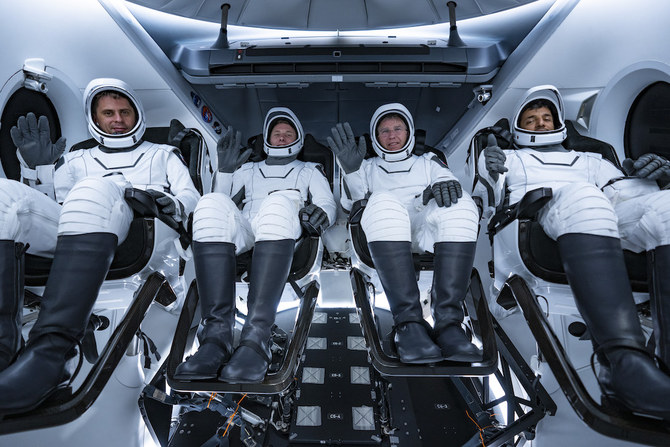MANILA: For many Filipinos, Lent is more than a religious observance — it is a cultural and culinary experience, where they swap their meat-heavy diets for simpler, plant-based fare.
The seven-week period, which started last month on Ash Wednesday, echoes the 40 days Jesus spent fasting in the desert. It will end with Holy Week, which marks his crucifixion, death and resurrection on Easter Sunday.
The period is a solemn time in the Philippines, the largest Catholic-majority nation in Asia, where believers are urged to pray, fast, give alms and reflect on their relationship with God.
A prominent tradition is abstaining from meat. Church laws prescribe it on all Fridays during Lent, but many devout Catholics choose to abstain for the entire Holy Week. This includes flesh and organs, as well as soups or gravies made from them.
For many Filipinos, Lent represents a time for reflection while growing up — “a quiet, respected practice,” said Tina Bautista, an entrepreneur in Manila, who in childhood used to spend the period at her mother’s ancestral home in Bulacan province.
“Older cousins who were in high school or college were encouraged to fast more seriously.”
Like many Filipino households, Bautista’s family had its own culinary traditions during Lent, and especially Holy Week, which is an occasion for Filipinos to return to their hometowns and reunite with loved ones.
Some of her favorite dishes included rellenong bangus (deboned, stuffed milkfish with carrots, peas, potatoes and spices); vegetable lumpia or Filipino spring rolls, served fried; fresh freshwater oyster kinilaw (a ceviche-like dish cured with vinegar); and a fish soup known as pesa, a ginger-based broth with potatoes, bok choy and cabbage, made with the fresh market catch and served with a side of sauteed tomatoes resembling chutney.
Easter usually culminated in a celebration that began with a 3 a.m. parade, with her family’s cart carrying the image of Santa Jacobe — known as the mother of James the Apostle — all the way to the church, where they attended Sunday mass. The family would break their fast with chicken soup and pan de sal — a Filipino breakfast roll.
More festive dishes would follow later in the day, including embutido — a pork meatloaf stuffed with hard-boiled eggs and ham — along with steamed shrimp and crab, and leche flan, a rich Filipino custard served with caramel sauce.
Today, Bautista still avoids meat during Lent and Holy Week, even though the spirit of the tradition has changed for her.
“These days, I don’t observe everything strictly, but it still feels like a much-needed pause. It’s become a break from work, a time to rest and spend more time with family,” she said.
“I may not follow the old routines to the letter anymore, but new ones are slowly forming. It still feels meaningful — just in a more personal, present-day kind of way.”
For Carmelle Ramos, who comes from Bataan, some 170 km from Manila, Lent and Holy Week have traditionally been a time to whip up the best fish and vegetable dishes.
Her father’s special was fried salted fish marinated in white vinegar, pepper and garlic, paired with a sweetcorn stew.
“(My parents) were not too strict since they knew we were picky kids growing up, so from time to time they would cook fried chicken and spam,” Ramos told Arab News.
“But they still managed to make us ‘like’ fish and vegetables because they included us in the preparation of the food.”
In some households, however, the tradition of Catholic fasting is duly observed.
“My grandmother was very strict in preparing food during Fridays of Lent, especially on Good Friday,” said Alyssa Basero.
Staples on their table included shrimp sinigang, broth soured with tamarind, and ginataang kalabasa, or squash and string beans stewed in coconut milk.
Basero’s family continued to follow annual traditions as part of her late grandmother’s influence, including hearing mass, participating in the procession and Visita Iglesia — a pilgrimage to at least seven different churches to pray on Holy Thursday.
One of the customs she looks forward to falls on the eve of Easter Sunday, when she and her relatives attend mass at 11 p.m. and wait until midnight to witness the salubong — a pre-dawn Easter ritual in which a solemn procession of the images of the mourning Virgin Mary and a risen Christ meet from opposite ends in front of the church.
A chorus of children, sometimes singing from hanging platforms to create the illusion of flying in mid-air, sings to herald the occasion. One child is assigned to lift the black veil from the Virgin Mary, signifying the end of her mourning.
Lunch on Easter Sunday becomes then “a mini reunion” for Basero’s relatives after the period that she was brought up to see as a time of forgiveness and repentance.
“Forgiveness to those people who hurt me and did wrong to me — (I’m) forgiving them to bring me peace of mind and help me to move on,” she said.
“(And) repentance for my wrongdoing and bad behavior ... to bring me closer to God.”

























